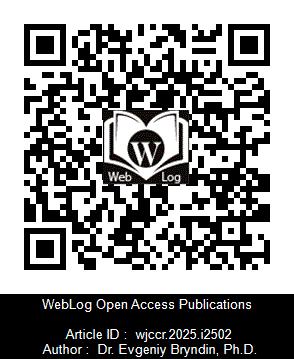
ARTICLE TYPE : RESEARCH ARTICLE
Published on : 25 Sep 2025, Volume - 1
Journal Title : WebLog Journal of Clinical Case Reports | WebLog J Clin Case Rep
Source URL: ![]() https://weblogoa.com/articles/wjccr.2025.i2502
https://weblogoa.com/articles/wjccr.2025.i2502
Permanent Identifier (DOI) :  https://doi.org/10.5281/zenodo.17283209
https://doi.org/10.5281/zenodo.17283209
Regression of Oncological Formations at the Tissue Level and Intercellular Fluid
Abstract
Abstract: Therapy of the interstitial fluid before the destruction of intercellular connections has two interrelated directions, firstly, a decrease in the interstitial fluid (interstitial fluid) and normalization of the tumor microclimate before the intercellular connections are destroyed, and secondly, the destruction of intercellular connections as part of therapy (to increase drug penetration. The interstitial fluid and the surrounding ECM environment come to the fore, and the intercellular connections themselves play a modifying role. The interstitial fluid (interstitial fluid) fills the space around the cells in the tumor. Often, its pressure is higher than normal (IFP), which limits the penetration of drugs and immune cells, contributes to hypoxia and the formation of an oxidative environment. Reducing IFP and loosening ECM improve the delivery of immunotherapy and weaken the intercellular connections of the tumor. Immune therapy focused on the interstitial fluid and ECM is aimed at destroying the connections of tumor cells, improving the penetration of immune cells into the tumor by reducing IFP and loosening ECM. Modification of intercellular connections and ECM occurs at f irst stages of treatment and reduces aggressive tumor growth. Modern therapies are focused on controlled modification of bonds with cytotoxic or immunotherapeutic agents. The regression effect depends on the tumor type, its microenvironment, stage, and combination of drugs used.
Keywords: Therapy; Intercellular Fluid; Cancer Tumor; Regression of Intercellular Connections
Citation
Evgeniy Bryndin. Regression of Oncological Formations at the Tissue Level and Intercellular Fluid. WebLog J Clin Case Rep. wjccr.2025.i2502. https://doi.org/10.5281/zenodo.17283209